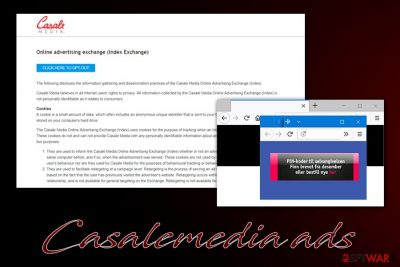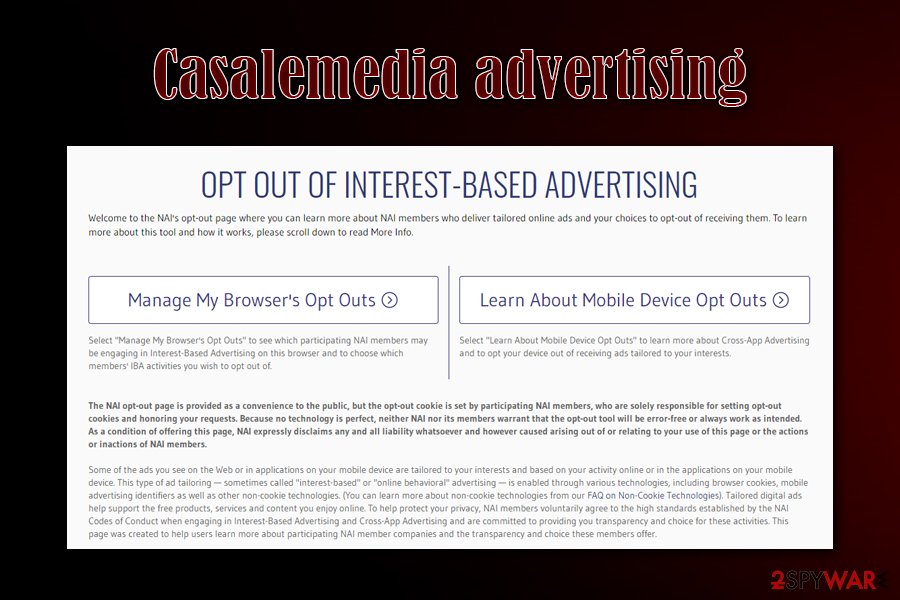Casalemedia (Simple Removal Guide) - Chrome, Firefox, IE, Edge
Casalemedia Removal Guide
What is Casalemedia?
Casalemedia is a legal advertising service but is sometimes abused by crooks to gain personal income

Casalemedia is a legitimate advertising service that provides assistance in monetizing on online content for various website developers. Nevertheless, potentially unwanted software like adware might abuse these advertisements and insert pop-ups, in-text links, flashing windows, pop-unders, banners, and other intrusive content during users' web browsing sessions.
As soon as Casalemedia adware gets into users' machines, it performs a variety of changes to Google Chrome, Safari, Mozilla Firefox, Internet Explorer, and other browsers. Cookies and other tracking technologies help the PUP to gather information about web browsing habits, which later helps with the targeted advertisement.[1]
Besides suffering from persistent ads, users might also accidentally expose their personal information while being infected with adware, putting privacy at risk. Therefore, if you noticed that your browsers are showing adware infection, you should read this article in order to remove Casalemedia ads for good.
| Name | Casalemedia |
| Type | Advertising network |
| Related to | Adware, potentially unwanted programs |
| Infection means | Software bundles, third-party sites |
| Targeted systems | Windows, Android, macOS, iOS |
| Related site | ip.casalemedia.com |
| Symptoms | Intrusive ads on all sites that you visit, redirects |
| Termination | Check out our guide below or use security software |
| Recovery | After you delete adware, scan your computer with FortectIntego to fix damage dine by the infection |
| Prevention | Use ad-blocker |
Users do not have to wait much for the Casalemedia ads to show up, and they can see the following when loading a new website or facing an intrusive ad:
- Brought to you by Casalemedia
- Ads by Casalemedia
- Advertisement by Casalemedia
- Provided by Casalemedia
- Casalemedia ads, etc.
While most of the shown content is harmless, you might sometimes end up on potentially dangerous sites that serve malicious ads or hacked domains that abuse exploits to insert malware into your system. In such a way, Casalemedia infection might become a much worse problem, as malware can record keystrokes, lock personal files, include your machine into a botnet,[2] and perform other malicious activities.
Another Casalemedia virus infection symptom that you might face is the rerouting tendency. During your browsing sessions, you can get redirected at any time to an unknown site which promotes specific goods, which are based on your previous browsing habits. This way, the adware authors gain money for each click and purchase you make on these sites.

Thus, if you value your privacy and want to avoid possible malware infections, as well as get rid of the intrusive ads you face on all sites, you should take care of Casalemedia removal. You can do that either with security software or by following our guide below. After that, you need to reset each of the installed browsers and scan your computer with FortectIntego for best results.
Pay close attention to third-party software installation – PUPs are hidden inside
Over the years, software bundling advanced and became more common and also more deceptive. This questionable marketing technique is used not only by legitimate software developers but, most commonly, by authors of freeware and potentially unwanted apps.
Without a doubt, there is no such thing as “free software.” Users then pay in other ways – either in-app purchases or have to deal with intrusive ads as long as the program is installed on the system. Luckily, not all ads are malicious or tampering with the installed browsers. However, persistent advertisements and redirects should be a concern.
Overall, it is best to avoid PUPs entirely, and the best way to do that is by following these easy tips from experts:[3]
- Pick legitimate sources for your downloads (be aware that even the “known” sites like Download.com distribute PUPs within software installers);
- Always check if the app provides important documents like Terms of Service and Privacy Policy;
- Before installing anything unknown on your device, check out the reviews online;
- When prompted, always select Advanced or Custom installation settings instead of Recommended ones;
- Decline all deals, offers and other promotions by de-selecting pre-ticked boxes.

Delete adware to stop Casalemedia ads permanently
To remove Casalemedia virus, you will have to find and delete adware and other potentially unwanted programs that are installed on your system. For that, you can either check our step-by-step instructions below or make use of a powerful security tool. For novice users, we recommend picking the latter, as fixing all the adware changes might be a bit complicated.
Nevertheless, if you recently installed a program that you suspect of being a culprit, uninstalling it and resetting your browsers should complete Casalemedia removal. The last step is equally as important as the former, however, as adware is known to alter web browser settings and inserting cookies, which consequently might continue showing the unwanted ads and redirect to suspicious sites.
You may remove virus damage with a help of FortectIntego. SpyHunter 5Combo Cleaner and Malwarebytes are recommended to detect potentially unwanted programs and viruses with all their files and registry entries that are related to them.
Getting rid of Casalemedia. Follow these steps
Uninstall from Windows
Instructions for Windows 10/8 machines:
- Enter Control Panel into Windows search box and hit Enter or click on the search result.
- Under Programs, select Uninstall a program.

- From the list, find the entry of the suspicious program.
- Right-click on the application and select Uninstall.
- If User Account Control shows up, click Yes.
- Wait till uninstallation process is complete and click OK.

If you are Windows 7/XP user, proceed with the following instructions:
- Click on Windows Start > Control Panel located on the right pane (if you are Windows XP user, click on Add/Remove Programs).
- In Control Panel, select Programs > Uninstall a program.

- Pick the unwanted application by clicking on it once.
- At the top, click Uninstall/Change.
- In the confirmation prompt, pick Yes.
- Click OK once the removal process is finished.
Delete from macOS
Remove items from Applications folder:
- From the menu bar, select Go > Applications.
- In the Applications folder, look for all related entries.
- Click on the app and drag it to Trash (or right-click and pick Move to Trash)

To fully remove an unwanted app, you need to access Application Support, LaunchAgents, and LaunchDaemons folders and delete relevant files:
- Select Go > Go to Folder.
- Enter /Library/Application Support and click Go or press Enter.
- In the Application Support folder, look for any dubious entries and then delete them.
- Now enter /Library/LaunchAgents and /Library/LaunchDaemons folders the same way and terminate all the related .plist files.

Remove from Microsoft Edge
Delete unwanted extensions from MS Edge:
- Select Menu (three horizontal dots at the top-right of the browser window) and pick Extensions.
- From the list, pick the extension and click on the Gear icon.
- Click on Uninstall at the bottom.

Clear cookies and other browser data:
- Click on the Menu (three horizontal dots at the top-right of the browser window) and select Privacy & security.
- Under Clear browsing data, pick Choose what to clear.
- Select everything (apart from passwords, although you might want to include Media licenses as well, if applicable) and click on Clear.

Restore new tab and homepage settings:
- Click the menu icon and choose Settings.
- Then find On startup section.
- Click Disable if you found any suspicious domain.
Reset MS Edge if the above steps did not work:
- Press on Ctrl + Shift + Esc to open Task Manager.
- Click on More details arrow at the bottom of the window.
- Select Details tab.
- Now scroll down and locate every entry with Microsoft Edge name in it. Right-click on each of them and select End Task to stop MS Edge from running.

If this solution failed to help you, you need to use an advanced Edge reset method. Note that you need to backup your data before proceeding.
- Find the following folder on your computer: C:\\Users\\%username%\\AppData\\Local\\Packages\\Microsoft.MicrosoftEdge_8wekyb3d8bbwe.
- Press Ctrl + A on your keyboard to select all folders.
- Right-click on them and pick Delete

- Now right-click on the Start button and pick Windows PowerShell (Admin).
- When the new window opens, copy and paste the following command, and then press Enter:
Get-AppXPackage -AllUsers -Name Microsoft.MicrosoftEdge | Foreach {Add-AppxPackage -DisableDevelopmentMode -Register “$($_.InstallLocation)\\AppXManifest.xml” -Verbose

Instructions for Chromium-based Edge
Delete extensions from MS Edge (Chromium):
- Open Edge and click select Settings > Extensions.
- Delete unwanted extensions by clicking Remove.

Clear cache and site data:
- Click on Menu and go to Settings.
- Select Privacy, search and services.
- Under Clear browsing data, pick Choose what to clear.
- Under Time range, pick All time.
- Select Clear now.

Reset Chromium-based MS Edge:
- Click on Menu and select Settings.
- On the left side, pick Reset settings.
- Select Restore settings to their default values.
- Confirm with Reset.

Remove from Mozilla Firefox (FF)
Remove dangerous extensions:
- Open Mozilla Firefox browser and click on the Menu (three horizontal lines at the top-right of the window).
- Select Add-ons.
- In here, select unwanted plugin and click Remove.

Reset the homepage:
- Click three horizontal lines at the top right corner to open the menu.
- Choose Options.
- Under Home options, enter your preferred site that will open every time you newly open the Mozilla Firefox.
Clear cookies and site data:
- Click Menu and pick Settings.
- Go to Privacy & Security section.
- Scroll down to locate Cookies and Site Data.
- Click on Clear Data…
- Select Cookies and Site Data, as well as Cached Web Content and press Clear.

Reset Mozilla Firefox
If clearing the browser as explained above did not help, reset Mozilla Firefox:
- Open Mozilla Firefox browser and click the Menu.
- Go to Help and then choose Troubleshooting Information.

- Under Give Firefox a tune up section, click on Refresh Firefox…
- Once the pop-up shows up, confirm the action by pressing on Refresh Firefox.

Remove from Google Chrome
Delete malicious extensions from Google Chrome:
- Open Google Chrome, click on the Menu (three vertical dots at the top-right corner) and select More tools > Extensions.
- In the newly opened window, you will see all the installed extensions. Uninstall all the suspicious plugins that might be related to the unwanted program by clicking Remove.

Clear cache and web data from Chrome:
- Click on Menu and pick Settings.
- Under Privacy and security, select Clear browsing data.
- Select Browsing history, Cookies and other site data, as well as Cached images and files.
- Click Clear data.

Change your homepage:
- Click menu and choose Settings.
- Look for a suspicious site in the On startup section.
- Click on Open a specific or set of pages and click on three dots to find the Remove option.
Reset Google Chrome:
If the previous methods did not help you, reset Google Chrome to eliminate all the unwanted components:
- Click on Menu and select Settings.
- In the Settings, scroll down and click Advanced.
- Scroll down and locate Reset and clean up section.
- Now click Restore settings to their original defaults.
- Confirm with Reset settings.

Delete from Safari
Remove unwanted extensions from Safari:
- Click Safari > Preferences…
- In the new window, pick Extensions.
- Select the unwanted extension and select Uninstall.

Clear cookies and other website data from Safari:
- Click Safari > Clear History…
- From the drop-down menu under Clear, pick all history.
- Confirm with Clear History.

Reset Safari if the above-mentioned steps did not help you:
- Click Safari > Preferences…
- Go to Advanced tab.
- Tick the Show Develop menu in menu bar.
- From the menu bar, click Develop, and then select Empty Caches.

After uninstalling this potentially unwanted program (PUP) and fixing each of your web browsers, we recommend you to scan your PC system with a reputable anti-spyware. This will help you to get rid of Casalemedia registry traces and will also identify related parasites or possible malware infections on your computer. For that you can use our top-rated malware remover: FortectIntego, SpyHunter 5Combo Cleaner or Malwarebytes.
How to prevent from getting adware
Stream videos without limitations, no matter where you are
There are multiple parties that could find out almost anything about you by checking your online activity. While this is highly unlikely, advertisers and tech companies are constantly tracking you online. The first step to privacy should be a secure browser that focuses on tracker reduction to a minimum.
Even if you employ a secure browser, you will not be able to access websites that are restricted due to local government laws or other reasons. In other words, you may not be able to stream Disney+ or US-based Netflix in some countries. To bypass these restrictions, you can employ a powerful Private Internet Access VPN, which provides dedicated servers for torrenting and streaming, not slowing you down in the process.
Data backups are important – recover your lost files
Ransomware is one of the biggest threats to personal data. Once it is executed on a machine, it launches a sophisticated encryption algorithm that locks all your files, although it does not destroy them. The most common misconception is that anti-malware software can return files to their previous states. This is not true, however, and data remains locked after the malicious payload is deleted.
While regular data backups are the only secure method to recover your files after a ransomware attack, tools such as Data Recovery Pro can also be effective and restore at least some of your lost data.























